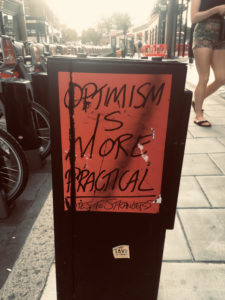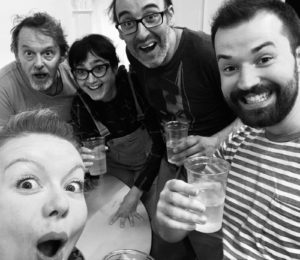Week Seven: Notre Dame, Indiana/Chicago, Illinois
By Kaffe Keating
“O time, thou must untangle this, not I. It is too hard a knot for me to untie.”
– Viola, Act 2 Scene 2.
I feel like I haven’t written one of these in ages. Time does indeed fly when you’re having fun, but simultaneously I think it’s true that time stretches when you fill it with stimuli; the more you do the longer things seem to last. And this week feels like it’s taken ages.
Monday brought our first proper visit to Washington Hall, the theatre on campus where we’ll do our first three performances of the show to a full audience. God, we need it. We’re now long past the point where we know the show well enough to no longer be surprised by the gags, and therefore we’ve stopped laughing audibly at them. It’s probably just as well; when your priority becomes making the other actors in the company laugh, you’re heading for trouble.
You might think it’s more tiring performing to a full audience than an empty house; that speaking your lines to nothing but the golden seat number plaques blinking back at you requires less focus and effort than when there are actually people sitting in the seats watching, but the reverse is actually true. When there’s an audience in the room your energy is going somewhere, it’s being absorbed and bounced back at you – when theatre is live it’s, well, live. Performing to an empty space is like shouting into a hole. Producers like full houses because that means lots of money from ticket sales; actors like full houses because we have more people to talk to.
And we will soon! We open on Wednesday. But the show is currently running long. We’re performing the play completely uncut. Unlike a lot of other Shakespeare plays (cough, Hamlet, cough), Twelfth Night is short enough that you can do the whole thing without everyone having to sit there for 4 hours, but we’re still taking longer than we need to. We need to shave off about 5 minutes from each half. Maybe doesn’t sound like much, but it makes a difference.
I always think it’s more about how long a play feels than how long it actually is. I’ve watched three-hour epics with two intervals that have breezed by and fifteen minute shorts which have lasted eons. Time does not fly at all when you’re watching something boring. However, cutting fat is always good. If time isn’t being spent on something interesting then it shouldn’t be being spent at all.
There are two ways to shave a show: speed up, or cut. Cutting at this stage would be seriously tricky, not only would we need to basically relearn our lines, but the timings we’ve worked out for set-pieces and quick changes would be totally thrown off. So speed it is then: thinking on the line, driving through longer sections of text, and not dropping props or forgetting that, actually, you are in this scene and everyone’s waiting for your entrance while you sit, staring at them from the back.
Not only is this our first week of performances, but our first week of classes too. And the first class that Al, Katherine and I are going to be running is not going to be on the Notre Dame campus or indeed for Notre Dame students. Instead, our workshop will be held at the Westville Correctional Facility, Medium Security Wing.
Many of the students on the program at Westville have transferred there specifically to take this course. They are required to have at least 2 years before their release date in order to take part, giving them time to get the qualifications required to get their bachelors’ degree. Ricky Klee, one of the teachers on the program, picks us up from our hotel and drives us out to the facility. He tells us some pretty astounding statistics. Of all the people who enter Westville, 30% will usually return. Of the people on this program however, that number drops to 3%. “The power of education,” Ricky says, as he walks us across the forecourt between the medium and minimum security wings.
We’ve left all our belongings in the car, bringing only our ID, one unopened bottle of water each, and a few sheets with some Shakespeare text on for the workshop. The students have been working through Twelfth Night, and later on will be performing sections of it themselves. The ones we’ll be working with today are only in the first two weeks of their course, and don’t know each other that well yet, so we’ve decided to spend the first half of the workshop on ensemble exercises and games – the sort you’d play in the first week of rehearsal to get a company spirit forming.
I’m nervous. We all are. We’ve been told that the students are really excited to meet us. That, normally, the only people who come in to talk to them are coming from a relatively fundamentalist religious perspective so this is a breath of fresh air for them. But still, it’s impossible to know what to expect.
But the nerves dissipate within minutes. They’re so up for it, so willing to join in, to play the stupid games we ask them to. They’re exactly what you want from a group of people to teach.
The focus is incredibly impressive. There’s a game I like to play which requires everyone in the circle to complete a simple task in sequence, but working together as a group. As the group gets better at each sequence, you add more sequences until everyone is walking around, throwing balls to each other, calling out each other’s names. It requires a real zen-like focus from everyone involved and this group picked it up faster than most companies of professional actors I’ve worked with.
Katherine led a game of Grandmother’s footsteps, when everyone tries to get hold of an item being guarded by ‘Grandma’. When she’s turned away, you can move but if she turns back and you’re not standing dead still, she’ll send you back to the start. One student, William (who must have been about six-foot-three), performed what can only be described as a swan dive, sliding across the floor to grab hold of Katherine’s scarf before she had time to turn around and spot him. Commitment you’d rarely get in a rehearsal room full of actors in week one who are still digesting their breakfast.
After the workshop, we said goodbye to the students and left the way we came in. That sound that you’ve got in your head of a prison door slamming? Yes, that one. The one you’ve heard on TV. It sounds exactly like that, and it pleases the ear a lot more when you’re on your way out. After hearing Ricky’s statistics and getting to work with the students themselves, I’m hopeful that most of the men we met today will only have to hear that sound one more time.
We tech the show. Technical rehearsals are usually very long affairs, featuring lots of people sat in a dark room for hours on end trying to figure out how to get that piece of scenery on, or making sure that that lighting cue is coming at the right time. Everyone usually goes a bit mad in tech, but luckily, since this show all fits in a suitcase and we’ve got hardly any lighting cues, that side of things is relatively painless.
 We treat the tech as a dress rehearsal, and run the show like we would if we had an audience in. Except, of course, we don’t. Yelling once more into the void. We run long again, we need to pick up the pace if we’re going to avoid having to cut.
We treat the tech as a dress rehearsal, and run the show like we would if we had an audience in. Except, of course, we don’t. Yelling once more into the void. We run long again, we need to pick up the pace if we’re going to avoid having to cut.
It’s late and we’re tired, but we’ve got the theatre for a few more hours and we all want to make use of this time. The idea is floated to do a speed run of just the text. No umbrellas, no staging, just the five of us (and Sidney, our lovely and, sadly, temporary stage manager) sat in a circle on stage powering through the story as quickly, but also clearly, as we can.
It’s exactly what we needed. There have been two types of pausing going on: The first is when we feel like we need to take time over a moment for dramatic reasons. We almost always don’t, and these are eradicated with a vengeance. The second type of pause comes when we’re dodgy on our lines and we’re trying to pass it off as type one. These too, are run over and over until they’re tight.
We open to a lovely audience. They’re warm, friendly, and up for joining us on our slightly mad trip through Illyria. Immediately we breathe a sigh of relief as a company, there’s someone to talk to! And the show goes down a treat. Especially the carriage. Those horses have escaped the knacker’s yard for good. And we’ve shaved off the time we needed to! If you don’t count the additional couple of minutes for audience laughter, which I don’t…
This weekend Notre Dame are playing at home, so the entire campus is ramping up to go fully
football crazy. We perform our last performance at Washington Hall, say fond goodbyes to the
wonderful Notre Dame team, and pack up our case to hit the road again for a weekend off in
Chicago.
What a city. We’re blessed with uncharacteristically wonderful weather – supposedly their summer has been a bit of a washout, we can sympathise – and we explore as much as we can. The big bean in Millennium Park, a river cruise with an incredibly thorough tour guide, cocktails on top of a skyscraper and real Chicago blues, played live. Also, Chicago has a beach – who knew?
We were only there for two days, but blimey did we squeeze a lot in. Time flew, but it does feel like there was a lot of it.
Now we’re flying again too, from Chicago down to Austin, where the tour really begins. We’ve left our home in Indiana and are venturing out on our own; just the five of us, a suitcase full of umbrellas and a couple of imaginary horses.





